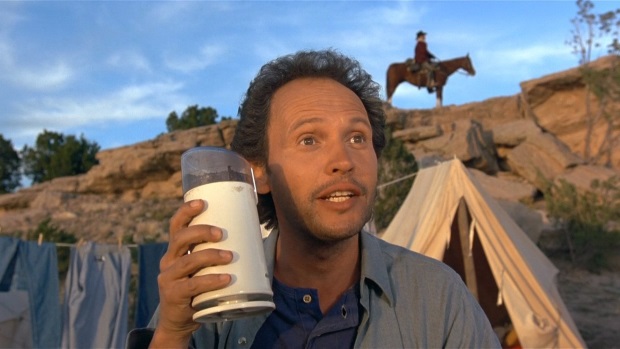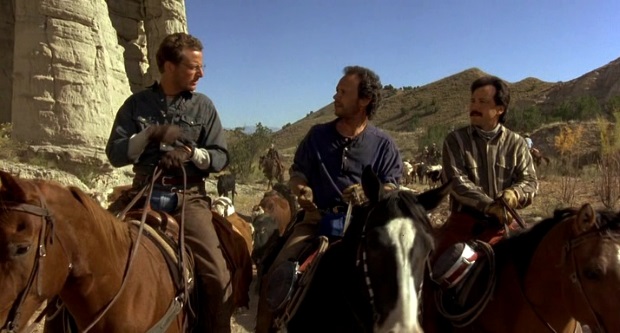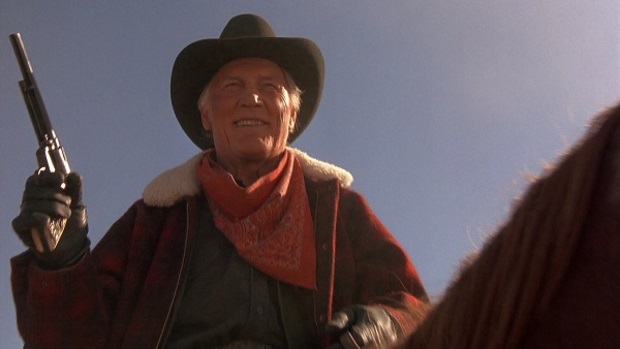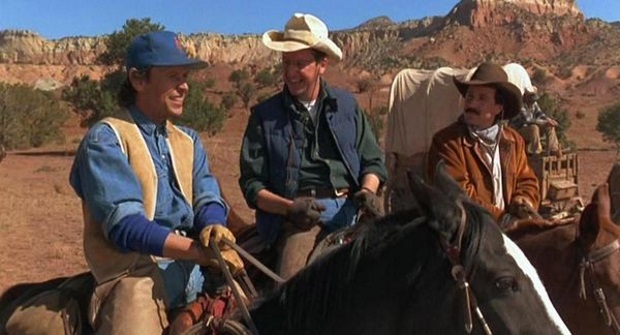Spoilers for City Slickers lie ahead.
Sandwiched between the two big tentpole blockbuster hits of summer 1991 was a genuine sleeper surprise. Whilst it had long been pre-ordained that the Arnold Schwarzenegger-headlined Terminator 2: Judgment Day would rule the summer season with the Kevin Costner-starring Robin Hood: Prince Of Thieves, what few saw coming was a film called City Slickers.
It came from the pen of Lowell Ganz and Babaloo Mandel, the comedy-writing team who scripted 1989’s brilliant Parenthood. They co-write the film with Billy Crystal (who didn’t receive credit), who also conceived the idea for the film. And as with most unlikely successes, it had a bit of a history to it.
Crystal came to the idea in the aftermath of his success in When Harry Met Sally, which led to some of the creatives involved in that film – including director Rob Reiner – putting together Castle Rock Pictures. Castle Rock, though, needed movies, and they asked Crystal if he had any ideas. They gave him an office, the opportunity to direct his projects (which he’d eventually take up with the movie Mr Saturday Night), and gave him a small development fund.
None of that helped at first. Instead, Crystal was watching television at home, and came across a documentary where a bunch of friends went scuba diving. One of the divers, he recalled in his book Born Standing Up, uttered the phrase “it helped the midlife crisis I was having”. Crystal started writing the film pretty much straight away.

He wrote on his pad that three friends would go on a fantasy cattle drive together, but the crusty trail boss encounters a problem, that leads to them having to herd the cattle home themselves.
Given that the team at Castle Rock – along with Ganz and Mandel – were all in and around their forties, it wasn’t initially the toughest sell. The project came together really rather quickly. “It was that fast. No studio interference, no midlevel executives, no notes on every page, instead, it was simply: Go do it”, Crystal recalled.
And that’s just what they did. Even the opening scene – where the three friends tackle the running of the bulls in Pamplona – was in process minutes after it was pitched. The project was moving fast, and Tremors director Ron Underwood soon signed up.
But there were problems ahead.
Crystal, Bruno Kirby and Daniel Stern were ultimately cast as the three leads, but the latter was a fairly late replacement. Rick Moranis was cast in the role, and a programme of horse riding training was organised. Crystal did his, but the late, great Bruno Kirby was allergic to horses. Heavily allergic, as it turned out. Before every day’s film, Kirby had to take an injection of medicine just to be able to shoot. He would go on to have such a bad time making the film, that he ducked out of the sequel (Jon Lovitz would be hired in a sort-of-replacement role).

In the case of Moranis, life took an even worse turn. In the midst of preparation for the film, his wife was diagnosed with a serious illness, that would ultimately claim her life. He left the film, and Daniel Stern joined late on in his place. Stern, incidentally, opted to bypass the horse riding training, to aid the authenticity of his character.
The most notable casting story from the film concerned the late Charles Bronson. When Jack Palance was sought for the role of Curly in the film, his lack of availability led to Crystal courting other options. He got in touch with Charles Bronson, to gauge his interest. That level of interest was not high.
Bronson’s agent assured Crystal and his team that he would read the script, and within 24 hours of Palance having to pull out of the movie, Crystal was told to expect a call. Charles Bronson duly rang. His first words to Crystal? “Fuck you”.
Whilst Crystal waited to see if Bronson was pulling his leg, a tirade ensued. Again, to quote the excellent book Born Standing Up, Bronson reiterated his exclamation, and added “I’m dead on page 64! How dare you send this to me … You have a lot of nerve … I don’t die in my films” (er, not strictly true that, but spoilers).
Crystal protested that it was a “great part” he was being offered, but Bronson was having none of it. “No it’s not – I’m dead on page sixty-fucking-four”. Bronson hung up. And then the phone rang again: Jack Palance could take the role on after all. He won his only Academy Award for playing it, too.

It proved to be a tricky shoot, often in the outdoors, often with lots of livestock. The only way to keep warm in one particular water-based scene was for Crystal to urinate in his wetsuit: the temperature of pee was notably higher than the water he was stuck in. Crystal sustained lots of bruising when, mid-stream, a calf started kicking out at him. For a man who’s primarily plied his trade in comedy, this was an action sequence way out of his level of experience.
But the shoot was generally a happy and peaceful one. There was some initial frostiness between Palance and the rest of the cast and crew on day one. But as the veteran actor would later confess, he always got nervous on the first day.
The first test screening of City Slickers took a good while later, and for Castle Rock – for whom it was its first film – it was a nervous occasion. It soon became clear that it had something special on its hands. Test screening scores were very high from the off, and it eventually ended up playing – out of competition – at the Cannes Film Festival. As Crystal wrote about his time at Cannes, “I spied Charles Bronson sitting on a couch with Sean Penn. Bronson and I made eye contact, and I nodded slightly toward him (though I wanted to say “Fuck who?”), and he quietly got up and left”.

By the time the film won Palace its Oscar, it was one of the top five hits of the year in the US, outgrossing The Addams Family, Backdraft, Sleeping With The Enemy and the first Naked Gun sequel. 1991 wasn’t seen as a golden year at the box office – major vehicles such as Hudson Hawk and Hook underperformaned – but City Slickers was one of the absolute highlights.
And you know what? It still stands up. Because much of the film concentrates on conversations between three friends stuck in a rut, there’s something very relatable, and very funny, about it all. Lightning didn’t strike twice – director Ron Underwood along with the aforementioned Kirby weren’t back for the less-than-stellar sequel – but it certainly struck once. And for no greater honour, the late Barry Norman declared one particularly joyous moment in City Slickers the funniest scene he’d seen that year.
And why not?

